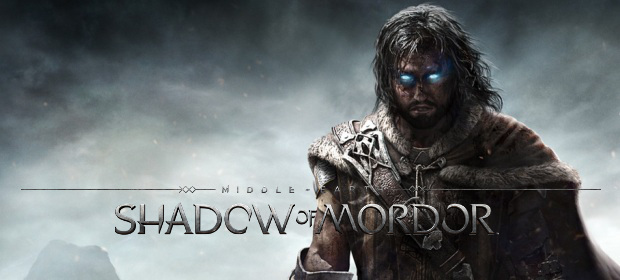Sometimes the very best things don’t come right for you like a South Park deer, they blind-side you out of nowhere. A few years ago a little studio named Rocksteady came careening out of left field to hit us with what turned out to be the greatest Batman game that ever was. It’s not that we didn’t know it was coming; we’d seen trailers and hype and lofty promises, but none of us truly expected Arkham Asylum to be as good as it was. The license had been abused so much, we just couldn’t trust anyone to do it justice, not even Warner Brothers.
Five years later, and history has been repeating itself like a bad curry ever since Warner Brothers announced Middle-earth: Shadow of Mordor. Like Batman, Tolkien’s genre-defining fantasy opus is a license that has never really been used to its potential. Occasional gems have been found among the rough, but ultimately fans of the franchise have always been left wanting something more. Initial trailers and screens for Mordor were uninspiring, showing an Assassin’s Creed-like stealth-em-up with a Middle-earth sheen. No one could blame us for feeling apprehensive.
But then I put the disc in the tray, booted up Shadow of Mordor, and experienced undeniable deja vu. Because Shadow of Mordor, against almost all our expectations, is excellent.
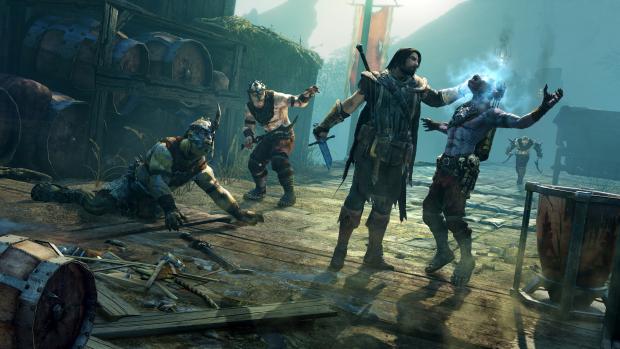
Set in the years between The Hobbit and The Fellowship of the Ring, this original story takes place within Mordor itself, as resurrected Ranger Talion sets out to avenge the death of his wife and son, as well as his own. Possessed by an Elfish Wraith, Talion has been brought back from the brink of death to destroy the Black Hand of Sauron, an evil tyrant determined to see the Dark Lord return.
Where Tolkien’s original tales championed the rejection of absolute power in favour of innate courage and sacrifice, Shadow of Mordor sees Talion welcoming the power of his ghostly symbiote, openly seeking the kind of bloody vengeance that Tolkien always avoided. As a result, it’s a darker Middle-earth than we’re used to seeing, and despite the familiar themes and visuals, it feels utterly original.
Much noise has reverberated around the obvious Assassin’s Creed comparisons both pre and post-release, but the truth is that it’s a less blindingly obvious game that Mordor draws the most parallels with. When you break it down into its component parts, Mordor is also Arkham Asylum in Middle-earth. While it’s true that Talion climbs solitary towers to fill in his map and can skulk around in bushes, his version of focused vision is closer to Batman’s Detective Mode than Eagle Vision, used to track quarry across the rugged terrain and find hidden collectibles.
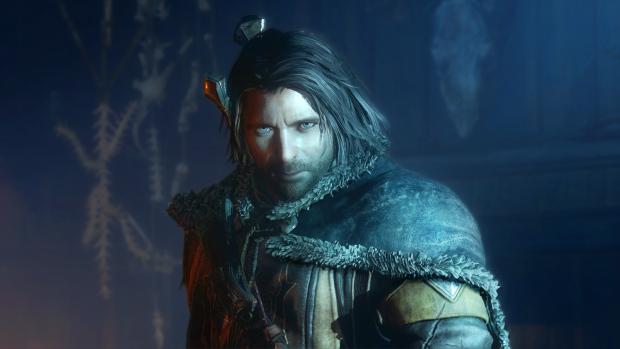
Enemy interaction takes several leaves from Batman’s handbook, too, as you use fear and deception to destroy and disorient your foes. The Uruks of Mordor respond like the Joker’s goons, becoming bolder the more you struggle, or turning tail when your assault proves unbreakable. If you panic and run they’ll look for you, call their brutish buddies, maybe give voice to their fears if you’ve recently proven your lethality.
The final parallel with Rocksteady’s superhero masterpiece is the combat. Counter-based and reactionary, the combat is free-flowing melee that sees Talion slinging himself around the battlefield, executing downed enemies and performing stylised instant kills whenever his Wraith-tainted sword begins to shine. Combos are tapped out with the Square button, while Cross lets you evade incoming attacks and Triangle performs a stylish counter. The number of combat animations is staggering, and there’s an undeniable beauty and grace to Talion’s epic confrontations. Throw the Warg-like Caragors and hulking Graugs into the mix, as well as ranged units and a multitude of enemy melee styles, and Mordor’s combat moves into a league of its own.
Should you fall, the Uruk that dealt the killing blow will be promoted to Captain, and join the ranks of the Uruk elite. Most of the main story missions centre on tracking and killing Captains, and it’s here, with the Nemesis System, that Shadow of Mordor elevates itself above its contemporaries. There is an entire social network at play beneath Mordor’s flesh, where Uruk Captains war for status and supremacy. This simple addition makes the world feel truly alive, as though the lives of your enemies are going on without your presence. More than this though, the Nemesis System gives each of your enemies an individual personality and memory.
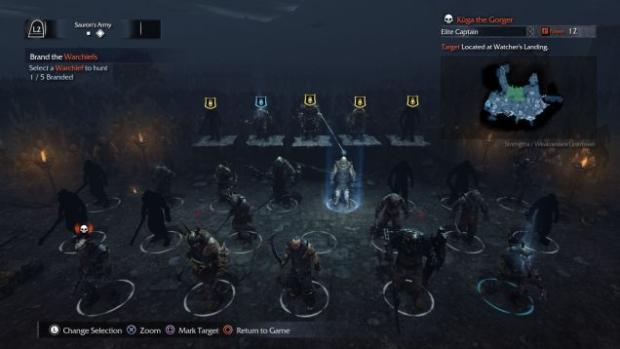
If you fall in battle, the killer will remember you when you rise again from the grave. If you put a Captain down and he survives, he will remember you and thirst for vengeance, and he’ll wear the battle scars you gave him. Run away, and he’ll call you a coward, exploit his weakness, and he’ll recall your actions with either respect or contempt. Interrogating enemies will give you additional information on Captains, and make you privy to their fears. If one is afraid of fire, throw him into flames; if he’s paranoid about Caragors, let one go, Far Cry 3-style, into the Uruk encampment. It’s an exceptional system that genuinely heightens your immersion in the world and makes you feel that it’s you and you alone dictating the fate of Mordor.
Should you decide you want a break from hunting Captains, you can partake of any of half a dozen or more side concerns, such as digging up artefacts (which borrows a mechanic wholesale from the Tomb Raider reboot), or freeing human slaves. Tapping L1 will call forth the Wraith to help you track down hidden treasures. Side quests also afford you upgrades to your sword, bow and dagger. While customisation isn’t really featured, you can pick and choose your skills as you progress, and you’ll acquire runes from dead Captains that add buffs to your weaponry. The combination of weapon runes and combat skills steadily increase Talion’s power and efficiency, and as his power grows and his humanity slowly seeps away, you will feel both his unease with his strange new gifts and his growing realisation that only by using these powers can he hope to avenge his family. It’s a powerful theme and Monolith use it well, conveying the sense of reluctant power without hitting you over the head with it.
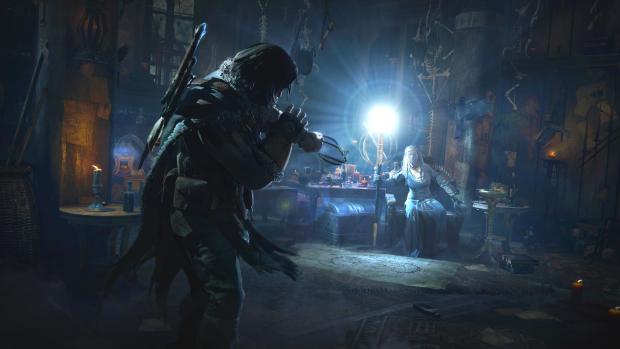
Unfortunately, such quality in the gameplay highlights flaws elsewhere. For example, the environments of Shadow of Mordor lean towards the brown end of the spectrum, so much so that you’d be forgiven for thinking the Unreal Engine was involved. That being said, the world is well-detailed and the animation is exceptional. The sound design is similarly high quality, from the stellar voice work to the quintessential Lord of the Rings ambience. The score is epic and sweeping, carrying a menacing undertone when it needs to and raising your pulse when a ruckus kicks off.
Other complaints are just as minor, but important enough to warrant mentioning. For starters, the camera is occasionally a little temperamental, and the combat suffers the same problems with clipping and collision as Batman’s did. It’s not unusual to see an enemy drop after your elbow has barely connected, or to spot a body caught in the floor or scenery. Also, there’s simply no denying that by the time you’ve finished the 12 to 15 hour campaign, the combat will have started to feel repetitive and a little by-the-numbers, despite its quality, and hoovering up all those missed artefacts and side missions may lose some of its lustre.
Just like Batman before it, Middle-Earth: Shadow of Mordor is the greatest Rings game we’ve seen, and is easily the best use of the license to date. The combat and Nemesis System alone are worth the asking price, but it’s the world itself that steals the show. Mordor is alive but dying, still vital but mortally poisoned by Sauron’s festering evil, a darkness that threatens to consume everything – even Talion himself. In a brave move, Shadow of Mordor eschews Tolkien’s almost trademark black and white hero versus villain dynamic to present a protagonist who walks in the grey places, caught between doing the right thing and satisfying his own need for vengeance and absolution.
Dark, compelling, and occasionally unflinchingly brutal, Shadow of Mordor is Lord of the Rings for grown-ups. It’s not just a good game based on an established franchise, but a fantastic game in its own right and one that deserves to be judged purely by its own merits, and not by what has come before.

SUPERB. This is the mark of greatness, only awarded to games that engage us from start to finish. Titles that score 9/10 will have very few problems or negative issues, and will deliver high quality and value for money across all aspects of their design.
Review code provided by publisher.


